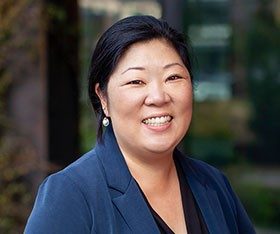Elaine Nam, Ph.D.

Elaine Nam
Chemistry Staff Scientist, Vernier Software and Technology, LLC
B.A., Chemistry, Pomona College, Claremont, CA
M.S., Chemistry, San Francisco State University, CA
Ph.D., Bioinorganic Chemistry, University of Washington, Seattle
Elaine Nam is in the business of teaching teachers. Her company, Vernier Software & Technology, LLC, is an educational software and equipment company that produces sensors and graphing software for use in science education. Elaine provides technical support for Vernier equipment and curriculum for educational institutions. One of her favorite parts about the job is working with educators. “I describe it as teaching smart students,” she says. “It is also very rewarding knowing that I am helping teachers educate students.”
Elaine came to the position after earning her Ph.D. in bioinorganic chemistry, and she found the job at a career fair held at an ACS National Meeting.
“The ACS career fairs are a great resource,” she says. Elaine took advantage of the opportunity to have her resume reviewed by several other ACS members and received useful feedback. She also used the meeting to arrange informal interviews with attending companies.
“Before heading to the career fair, I went to the job search portion of the ACS website to look for companies that were planning on attending the career fair and in my cover letter/email I made a point of mentioning that I would be attending the ACS meeting and wanted to meet,” she says. “Even though meeting with these companies was not an official interview, I did research on the company background and prepared as if this were the official interview. I also went to the exhibit hall and did some networking with the exhibitors to obtain contact information and leads for any job opportunities.”
The venture was successful. Now Elaine is a staff scientist at Vernier Software and Technology, LLC.
Compromising doesn't mean a person's ideas are not important. Compromising is taking the best ideas from everyone to have a successful final product.
Typical day on the job:
On a typical day, I spend my time on the following tasks:
- Answering technical support questions by phone, 20%
- Answering technical support questions by email, 15%
- Working in the lab (product testing, designing/testing lab experiments), 15%
- Planning for workshops and/or conferences, 10%
- Researching new products/product development, 20%
- Various meetings, 10%
- Working with other departments (Marketing, Repairs, Production, Software), 10%
Work environment:
I work in a cubicle and a lab. The lab is a shared space between all the chemists and biologists. The cubicle is equipped with a laptop computer and phone. The lab space has a fume hood and some benches for workspace.
Work schedule:
The average week is about 40 hours and overtime is not required. Because of some traveling for workshops and conferences, working on the weekend is required. The general environment is relaxed but can be fast paced when the academic school year starts.
Tools you can’t live without:
I use ChemDraw when writing lab experiments for Chemistry. ChemDraw is a great tool for any chemist when drawing chemical structures and reactions. The images can be inserted into presentations, articles, and reports.
Vernier offers instrumentation such as a gas chromatograph and spectrophotometers and these tools are important for science education. Vernier also offers an app call Graphical Analysis for iPad that can be used with our probeware. These would be crucial tools to be successful at my job.
Best productivity trick:
My best productivity trick is to work in the lab where I'm less likely to have interruptions.
Skills or talents that make you a good fit for your job:
Good social skills and willingness to compromise are important for this job. I collaborate with many departments. We work with programmers, software developers, marketing department, and engineers. Within our own department, we have a variety of science backgrounds (chemistry, biology, physics, math, and engineering.) When we develop new products, sometimes it is used by multiple disciplines. Compromise is important to make sure we have the best products for all our educators. Compromising doesn't mean a person's ideas are not important. Compromising is taking the best ideas from everyone to have a successful final product.
Essential habit you wish you’d started earlier:
Attempting to organize after the fact is challenging. I find it useful if I categorize and manage information (documents, articles, ideas, projects, etc) in the beginning. It also helps guide me and provides me with a goal when managing larger projects such as developing new products.
Favorite ACS resource:
My favorite ACS resource is the Webinars, specifically: “Covert Job Searching While Still Employed: Tips and Tricks” and “Insider Networking Tips and Tricks for Scientists.”
How you've benefited from being an ACS member:
I found my current job at an ACS National Meeting!

